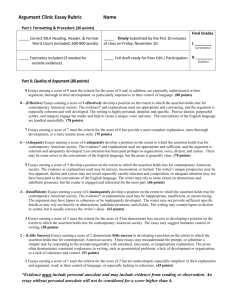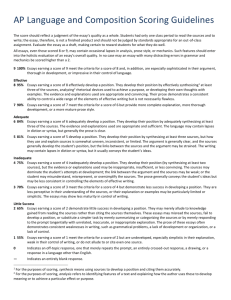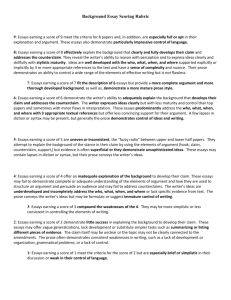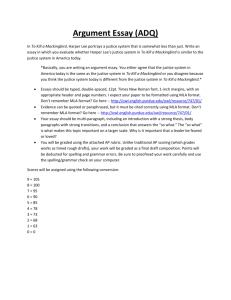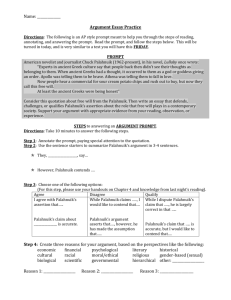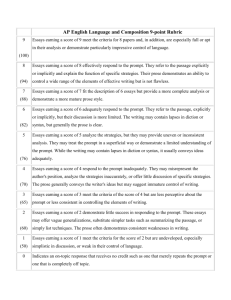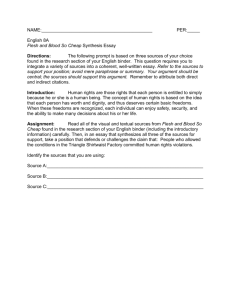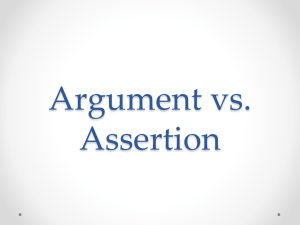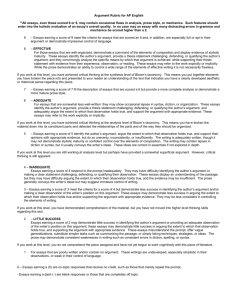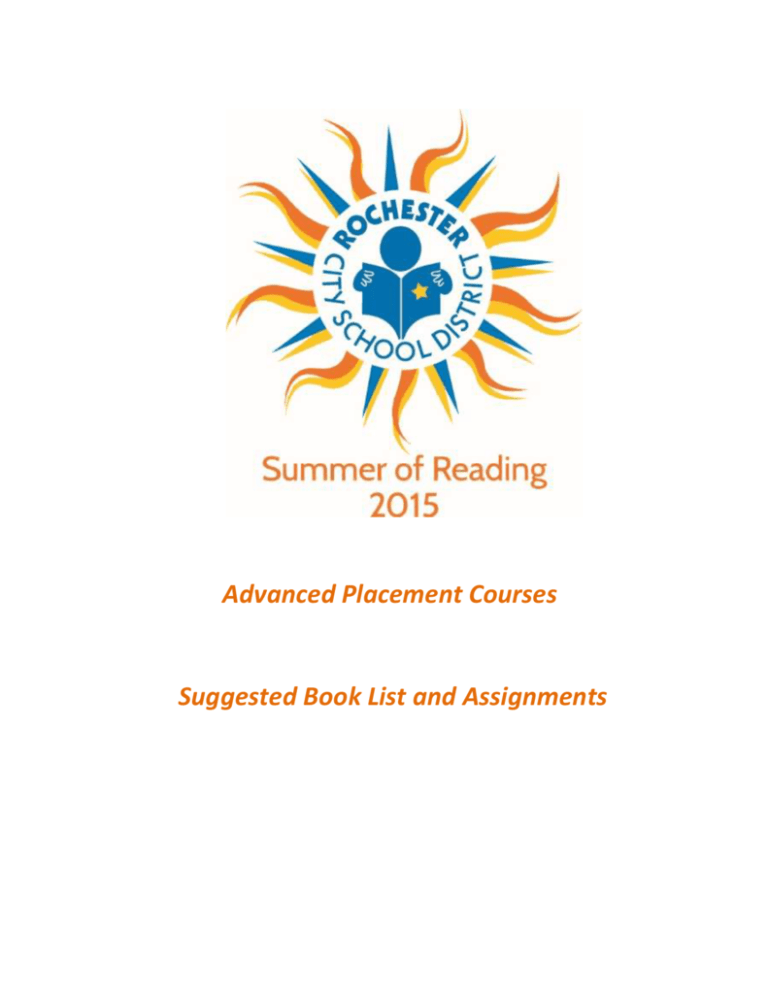
Advanced Placement Courses
Suggested Book List and Assignments
Summer Reading Program 2015
1. Pick up your Summer Reading Bookmark from your classroom teacher
2. Go to your local public library
3. Using the list below, choose a book of interest and appropriate level that you
would like to read
4. Read your book
5. Complete both assignments for credit in your next English class. Be sure to
follow the AP Language or AP Literature assignments and book selections for
the course in which you will be enrolled.
6. Return your book to your local public library
7. While you are there, you should check out another book to read!
8. Submit your assignment to school in September
AP Language and Composition
Summer Reading Assignment
Directions: Complete Part 1 and Part 2 prior to the start of your AP class.
Part 1 Directions: Using the book that you read this summer, respond to the following prompt to the best of
your ability. Do not merely summarize the plot in your response.
Discuss the author’s use of rhetorical strategies (diction, tone, imagery) to achieve their purpose. (500 words)
State the author’s purpose/central idea
Intended audience
How the author uses information in the text to achieve his/her goal
Part 2 Directions: Create an independent argument addressing the author’s claim. Choose to either support,
refute or qualify the author’s purpose/central idea using one additional outside text to support your argument.
Choose one of the following options:
Write your argument in a well-developed essay (500 words)
Make a video showing your argument
Create a power point or prezi of your argument
Video a debate of your argument with yourself or others arguing both sides of the argument
Write an interview transcript of someone expressing argument
Create a video blog of your experience reading the book that shows your development of an
understanding of the book you chose.
AP® ENGLISH LANGUAGE AND COMPOSITION
2009 SCORING GUIDELINES
All essays, even those scored 8 or 9, may contain occasional lapses in analysis, prose style, or mechanics. Such
features should enter into the holistic evaluation of an essay’s overall quality. In no case may an essay with
many distracting errors in grammar and mechanics be scored higher than a 2.
9
Essays earning a score of 9 meet the criteria for a score of 8 and, in addition, are especially
sophisticated in their argument, thorough in their development, or particularly impressive in their control of
language.
8 Effective
Essays earning a score of 8 effectively defend, challenge, or qualify Horace’s assertion about the role that
adversity plays in developing a person’s character. The evidence and explanations used are appropriate and
convincing. The prose demonstrates a consistent ability to control a wide range of the elements of effective
writing but is not necessarily flawless.
7
Essays earning a score of 7 meet the criteria for a score of 6 but provide a more complete
explanation, more thorough development, or a more mature prose style.
6 Adequate
Essays earning a score of 6 adequately defend, challenge, or qualify Horace’s assertion about the role that
adversity plays in developing a person’s character. The evidence and explanations used are appropriate and
sufficient. The writing may contain lapses in diction or syntax, but generally the prose is clear.
5
Essays earning a score of 5 defend, challenge, or qualify Horace’s assertion about the role that
adversity plays in developing a person’s character. The evidence or explanations used may be uneven,
inconsistent, or limited. The writing may contain lapses in diction or syntax, but it usually conveys the
student’s ideas.
4 Inadequate
Essays earning a score of 4 inadequately defend, challenge, or qualify Horace’s assertion about the role that
adversity plays in developing a person’s character. The evidence or explanations used may be inappropriate,
insufficient, or less convincing. The prose generally conveys the student’s ideas but may be less consistent in
controlling the elements of effective writing.
3 Essays earning a score of 3 meet the criteria for a score of 4 but demonstrate less success in
defending, challenging, or qualifying Horace’s assertion about the role that adversity plays in
developing a person’s character. The essays may show less maturity in control of writing.
2 Little Success
Essays earning a score of 2 demonstrate little success in defending, challenging, or qualifying Horace’s
assertion about the role that adversity plays in developing a person’s character. These essays may
misunderstand the prompt or substitute a simpler task by responding to the prompt tangentially with unrelated,
inaccurate, or inappropriate explanation. The prose often demonstrates consistent weaknesses in writing, such
as grammatical problems, a lack of development or organization, or a lack of control.
1
Essays earning a score of 1 meet the criteria for a score of 2 but are undeveloped, especially
simplistic in their explanation and argument, or weak in their control of language.
0
Indicates an on-topic response that receives no credit, such as one that merely repeats the
prompt.
— Indicates a blank response or one that is completely off topic.
© 2009 The College Board. All rights reserved.
AP Language Summer Reading Options
Kincaid, Jamaica. Annie John
Annie John is a haunting and provocative story of a young girl growing up
on the island of Antigua. A classic coming-of-age story in the tradition of
The Catcher in the Rye and A Portrait of the Artist as a Young Man,
Kincaid’s novel focuses on a universal, tragic, and often comic theme: the
loss of childhood. Annie’s voice—urgent, demanding to be heard—is one
that will not soon be forgotten by readers.
Pollan, Michael. Omnivores Dilemma
Today, buffeted by one food fad after another, America is suffering from what can
only be described as a national eating disorder. Will it be fast food tonight, or
something organic? Or perhaps something we grew ourselves? The question of
what to have for dinner has confronted us since man discovered fire. But as
Michael Pollan explains in this revolutionary book, how we answer it now, as the
dawn of the twenty-first century, may determine our survival as a species. Packed
with profound surprises, The Omnivore's Dilemma is changing the way
Americans thing about the politics, perils, and pleasures of eating.
Rodriguez, Richard. Hunger of Memory: The Education of Richard
Rodriguez
Hunger of Memory is the story of Mexican-American Richard Rodriguez,
who begins his schooling in Sacramento, California, knowing just 50 words
of English, and concludes his university studies in the stately quiet of the
reading room of the British Museum.
Sedaris, David. Me Talk Pretty One Day
A new collection from David Sedaris is cause for jubilation. His recent
move to Paris has inspired hilarious pieces, including Me Talk Pretty One
Day, about his attempts to learn French. His family is another inspiration.
You Cant Kill the Rooster is a portrait of his brother who talks incessant
hip-hop slang to his bewildered father. And no one hones a finer fury in
response to such modern annoyances as restaurant meals presented in
ludicrous towers and cashiers with 6-inch fingernails.
Robbins, Alexandra. The Geeks Shall Inherit the Earth
In a smart, entertaining, reassuring book that reads like fiction, Alexandra
Robbins manages to cross Gossip Girl with Freaks and Geeks and explain
the fascinating psychology and science behind popularity and outcasthood.
She reveals that the things that set students apart in high school are the
things that help them stand out later in life.
Satrapi, Marjane. Persepolis
Wise, funny, and heartbreaking, Persepolis is Marjane Satrapi’s memoir of
growing up in Iran during the Islamic Revolution. In powerful black-andwhite comic strip images, Satrapi tells the story of her life in Tehran from
ages six to fourteen, years that saw the overthrow of the Shah’s regime, the
triumph of the Islamic Revolution, and the devastating effects of war with
Iraq.
Wright, Richard. Black Boy
Black Boy is Richard Wright's powerful account of his journey from
innocence to experience in the Jim Crow South. It is at once an unashamed
confession and a profound indictment—a poignant and disturbing record of
social injustice and human suffering.
Orwell, George. Animal Farm
Animal Farm is the most famous by far of all twentieth-century political
allegories. Its account of a group of barnyard animals who revolt against
their vicious human master, only to submit to a tyranny erected by their own
kind, can fairly be said to have become a universal drama. Orwell is one of
the very few modern satirists comparable to Jonathan Swift in power,
artistry, and moral authority; in animal farm his spare prose and the logic of
his dark comedy brilliantly highlight his stark message.
Bryson, Bill. Mother Tounge
With dazzling wit and astonishing insight, Bill Bryson—the acclaimed
author of The Lost Continent—brilliantly explores the remarkable history,
eccentricities, resilience and sheer fun of the English language. From the
first descent of the larynx into the throat (why you can talk but your dog
can't), to the fine lost art of swearing, Bryson tells the fascinating, often
uproarious story of an inadequate, second-rate tongue of peasants that
developed into one of the world's largest growth industries.
Gladwell, Malcolm. The Tipping Point
The tipping point is that magic moment when an idea, trend, or social
behavior crosses a threshold, tips, and spreads like wildfire. Just as a single
sick person can start an epidemic of the flu, so too can a small but precisely
targeted push cause a fashion trend, the popularity of a new product, or a
drop in the crime rate. This widely acclaimed bestseller, in which Malcolm
Gladwell explores and brilliantly illuminates the tipping point phenomenon,
is already changing the way people throughout the world think about selling
products and disseminating ideas.
Levitt, Steven. Freakonomics
Which is more dangerous, a gun or a swimming pool?
What do schoolteachers and sumo wrestlers have in common?
How much do parents really matter?
These may not sound like typical questions for an economist to ask. But
Steven D. Levitt is not a typical economist. He studies the riddles of
everyday life—from cheating and crime to parenting and sports—and
reaches conclusions that turn conventional wisdom on its head.


